One of the most typical shortcomings of a VPN is the fact that it worsens your internet speed. Mind you, I’m talking about average and below-average providers that use outdated protocols that aren’t made with excellent performance in mind.
Unfortunately, the vast majority of VPNs follow this route, which is why many people avoid using them. Besides, nobody likes slow and sluggish internet browsing which ruins the overall experience. Today, I decided to talk about the fastest VPNs in 2025 – yes, there are some crazy-fast Virtual Private Networks out there!
In addition, I’ll also present my speed test results so that you can see how fast they really are. I assure you that it’s vital to choose a good-performing VPN for browsing, torrenting, streaming, and content creation, so if any of these ring any bells… well, you know what to do – keep reading.
How Did We Perform Our Speed Tests
Before talking about the fastest VPNs, let me talk more about how we perform our speed tests. You see, it’s not enough to perform a single speed test for each location and call it quits. The servers have different loads during different parts of the day, so it’s impossible to get accurate results this way.
To make sure the results are authentic and reflect the real-world scenarios, we tested each VPN 3 times a day for each server location and we did that for 3 days straight. We did our tests on Friday, Saturday, and Sunday, during which, the internet presence of other users is at its peak.
Of course, the VPNs might perform better during other days when the networks are less loaded, but we wanted to put them under extreme pressure and see how well they perform in this scenario. Also, we used the well-known Ookla speed test service, and all tests were done on Windows 10.
In addition, we tested our native internet speeds with the following results:
- Ping: 12 ms
- Download: 116.12 Mbps
- Upload: 12.64 Mbps
Of course, I should mention that all the results are compiled and we used the BEST results out of all 3 tests. Now that you know all our testing parameters and rules, I think it’s time we get to the subject and talk about the fastest VPN services.
The Fastest VPNs in 2025: Comparison of Providers With the Best Performance
When talking about providers with great performance, it’s worth mentioning that you’ll see premium VPNs below. With their newest protocols, huge server networks, and stable performance, these providers are going to give you the best possible speeds.
My top 5 favorites are below, so let’s take a look together.
1. NordVPN
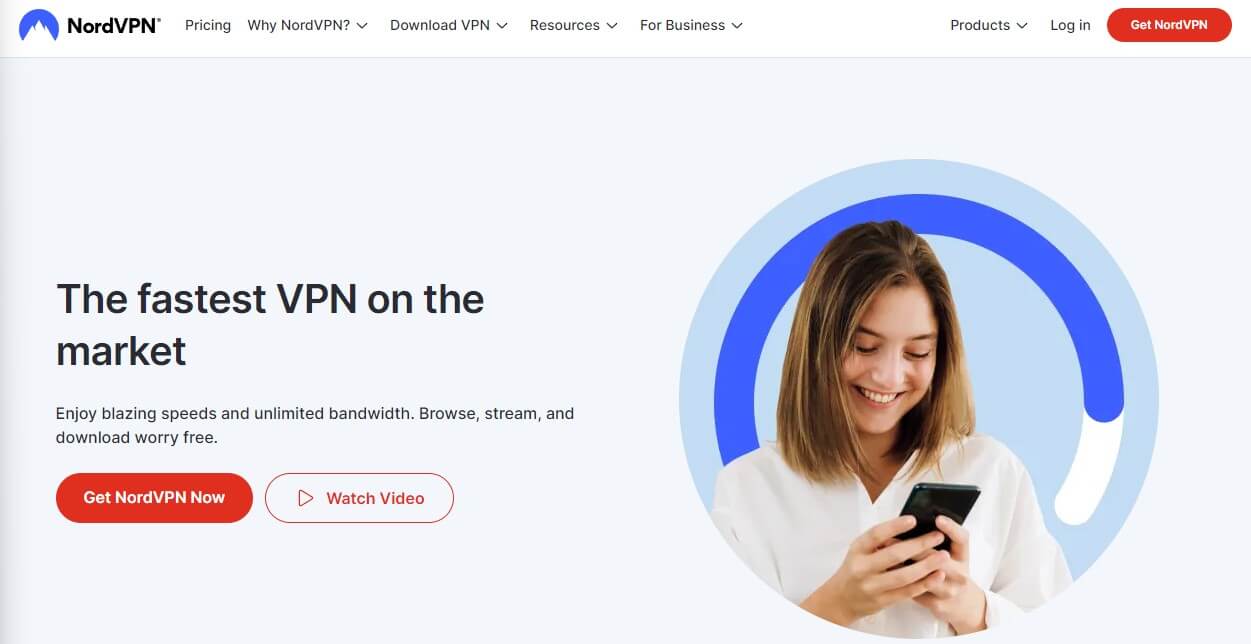
NordVPN is a provider I use daily because it’s the fastest VPN overall. It’s based in Panama, and from there, controls the network of 6,300+ servers in more than 111 countries. This server network will never suffer from overcrowding, as its huge user base has more than enough servers to connect to.
However, this is among the fastest VPN services due to its modern NordLynx protocol. NordVPN used WireGuard, injected it with steroids, and got NordLynx, which, next to Lightway, represents the pinnacle of the VPN industry.
This protocol isn’t only fast but also safe and secure. And being a default option in NordVPN, it’s obviously a much faster protocol than OpenVPN. Thus, this provider will be great for watching Netflix in 4K or downloading torrents thanks to its P2P servers.
NordVPN is highly secure, offering 256-bit encryption and a kill switch. This is backed by a no-logs policy that received two audits from PwC and one from Deloitte, giving NordVPN a significant advantage over its numerous competitors.
Speed Test Results
NordVPN and its NordLynx protocol showed impressive results as well. Now that you’ve seen my native internet speeds, here’s how NordVPN compares to them:
UK:
- Ping: 42 ms
- Download: 110.68 Mbps
- Upload: 12.02 Mbps
US:
- Ping: 122 ms
- Download: 84.71 Mbps
- Upload: 12.02 Mbps
Japan:
- Ping: 256 ms
- Download: 73.45 Mbps
- Upload: 11.98 Mbps
Australia:
- Ping: 331 ms
- Download: 65.28 Mbps
- Upload: 11.60 Mbps
With the results in place, you can see that NordVPN is truly the fastest VPN service you can get. Compared to our next pick, ExpressVPN, NordVPN is marginally faster but faster nonetheless. This is a phenomenal result given ExpressVPN’s excellent performance.
If you’re interested in NordVPN, I recommend its 2-year plan with a 30-day money-back guarantee, which is also its cheapest deal. That deal, you can get by using the button below. Find even more information by browsing our full NordVPN review.
2. ExpressVPN
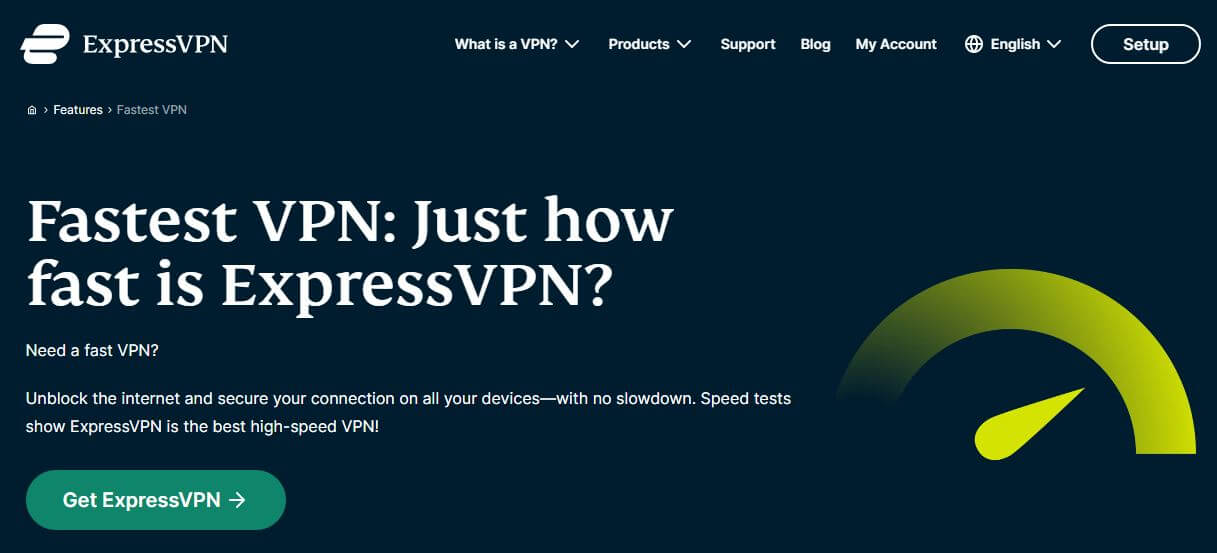
I’ve been saying that ExpressVPN is the fastest provider for quite a long time. In 2025, nothing changed except for the fact that NordVPN overtook it by a notch! You see, the provider has the proprietary Lightway protocol which is known to be one of the best on the market.
This is ExpressVPN’s secret recipe on how to make a good-performing AND secure protocol that severely beats the traditional OpenVPN. As a result, this is my favorite choice for 4K streaming, downloading, and browsing the web at lightning-fast speeds.
I should also mention its big server park. It packs 3,000+ servers in 105 countries and 160 locations around the globe. With so many servers, the network is never overcrowded, so you can enjoy top-notch performance regardless of the server location you choose.
Aside from awesome performance, ExpressVPN is known for its rock-solid security, certified zero-logging policy, and top-grade device compatibility. Needless to say, it is the fastest VPN on mobile platforms as well given its full support for Lightway on all platforms.
Speed Test Results
How fast it really is in practice? Well, we did several speed tests in the United Kingdom, the United States, Japan, and Australia, so check out the results below:
UK:
- Ping: 43 ms
- Download: 109.96 Mbps
- Upload: 11.77 Mbps
US:
- Ping: 122 ms
- Download: 84.13 Mbps
- Upload: 12.06 Mbps
Japan:
- Ping: 263 ms
- Download: 72.69 Mbps
- Upload: 6.96 Mbps
Australia:
- Ping: 231 ms
- Download: 61.89 Mbps
- Upload: 12.18 Mbps
ExpressVPN shows impressive results even when using very distant servers, with a very small reduction in download, and an almost unnoticeable reduction in upload speed. Therefore, this is the best choice if you’re into bandwidth-hungry activities like streaming (especially if you’re using Kodi), gaming, or downloading.
The great thing is that ExpressVPN currently offers a 49% discount plus 3 FREE months for its 1-year plan. In addition, you’ll get a 30-day money-back guarantee for all plans, making it easy to test it out for 30 days and see how fast it is – just in case you need any more proof.
Enjoy ExpressVPN’s Fast Speeds
3. CyberGhost
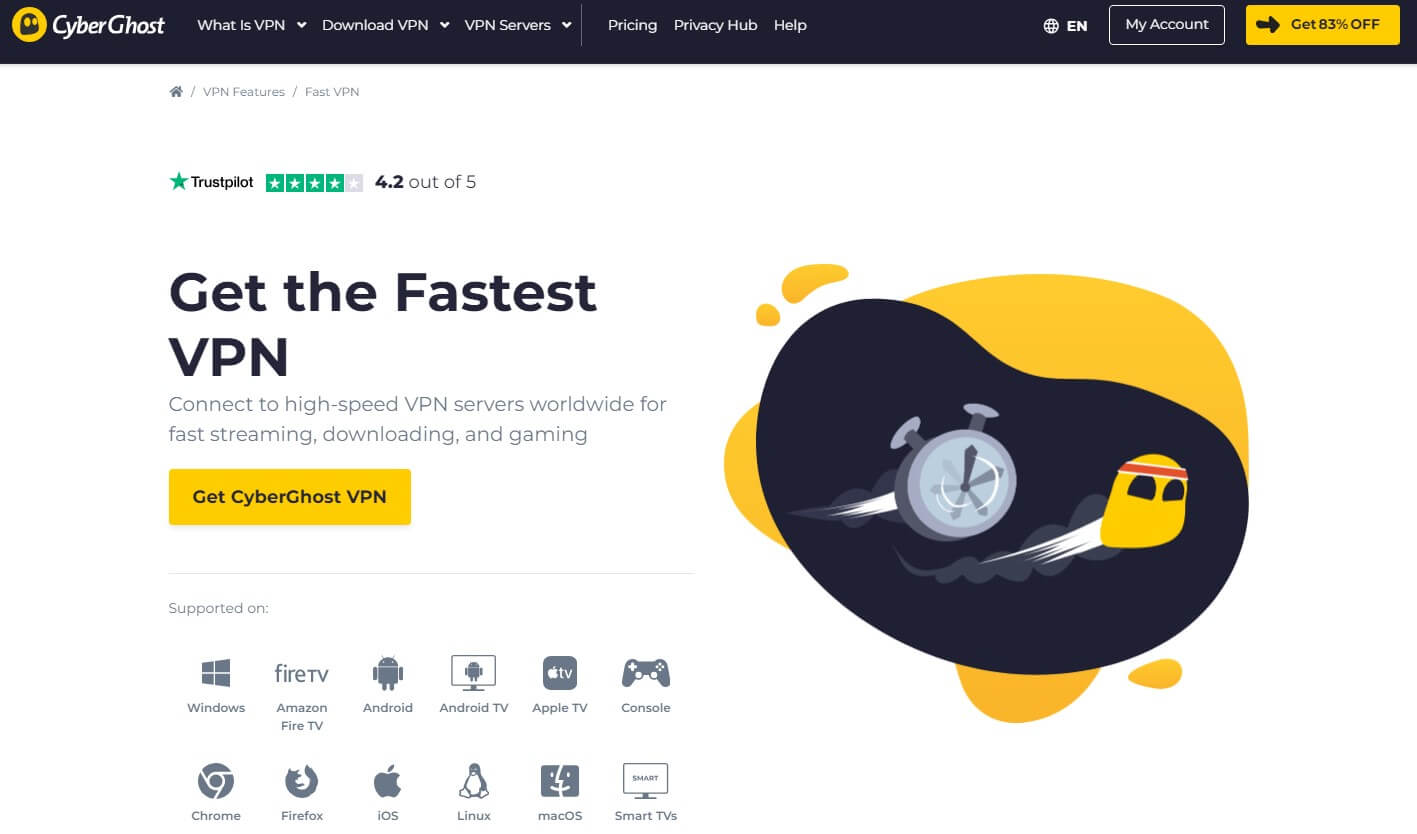
CyberGhost is easily my favorite cheap provider. Its cheap price doesn’t make it slow. In fact, it’s among the fastest VPN services in 2025, almost rivaling NordVPN and the much more expensive ExpressVPN. CyberGhost has 12,000 worldwide servers in nearly 100 countries, which is already impressive.
The provider even shows you the server load in %, letting you determine the best servers for the fastest speeds. However, its servers are rarely under the load of more than 50% as it has lots of them, so overcrowding is rarely – if ever – an issue.
My experience showed that it’s great for P2P and streaming especially when using its dedicated servers for this purpose. Moreover, it supports WireGuard, a lightweight, easy-to-maintain protocol that showed much faster connections and better performance than OpenVPN.
With a clear no-logging policy, bank-grade encryption, and an ad blocker, you’ll be quite unlikely to find a better VPN for the price. Not to mention that CyberGhost even received an audit from Deloitte in 2025, making it even more trustworthy than ever!
Speed Test Results
Let’s now check its speed test results. CyberGhost supports WireGuard and OpenVPN but we’ve used an “Automatic” option to let it determine the best protocol for the given situation. The results are the following:
UK:
- Ping: 40 ms
- Download: 99.59 Mbps
- Upload: 11.82 Mbps
US:
- Ping: 114 ms
- Download: 83.49 Mbps
- Upload: 10.38 Mbps
Japan:
- Ping: 265 ms
- Download: 69.83 Mbps
- Upload: 11.74 Mbps
Australia:
- Ping: 266 ms
- Download: 68.48 Mbps
- Upload: 11.81 Mbps
Compared to NordVPN and ExpressVPN, CyberGhost’s speed reduction is a bit more noticeable, although nothing over the top. It’s still pretty fast even on long-distance servers where it shows impressive download and upload speeds.
For a cheap provider, CyberGhost is quite impressive and so is its 2-year plan that costs way less than $2.5 a month. Of course, you can get this cheap deal and enjoy a 45-day no-condition money-back guarantee that no other provider will give you!
Try CyberGhost for Great Speeds
4. Surfshark
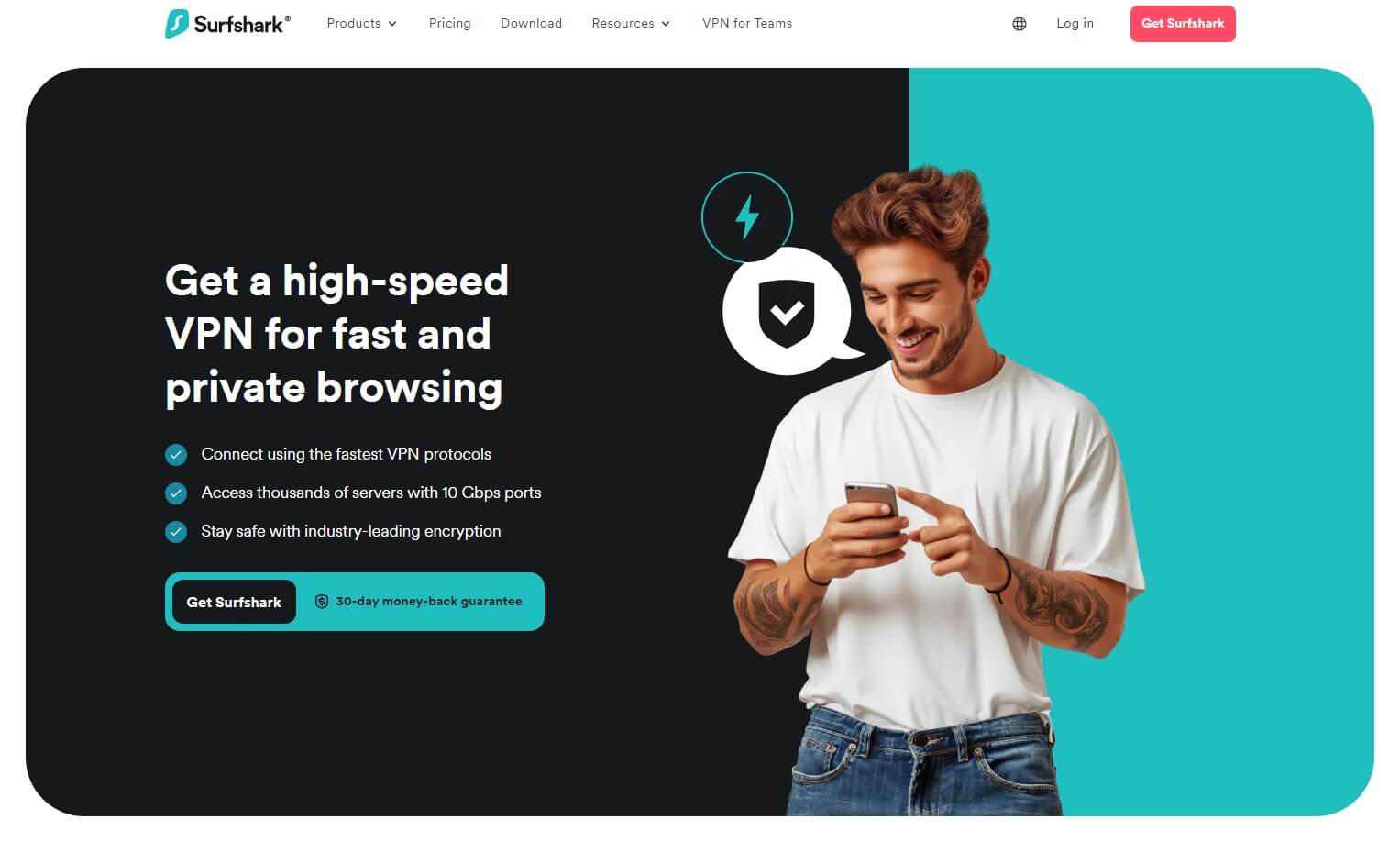
Surfshark is another affordable provider that will leave no one indifferent. It’s known for rock-solid security and anonymity due to its Dutch jurisdiction which makes this provider privacy-friendly, as the country is known for the lack of data-retention laws.
This provider comes with full WireGuard support on all platforms, and as said, this protocol is known for excellent speeds and impressive performance. Surfshark offers servers in 100 countries, and with 3,200+ of them, it’s guaranteed that overcrowding won’t be a problem.
Besides, you have the option to choose from the closest or fastest server, which lets Surfshark choose the best server for your needs. Being an affordable provider, it’s a bit slower than the previous three VPNs but I still found it satisfying enough for all my needs.
It’s great for streaming, downloading big files, and browsing the web with no slowdowns as long as you’re not using a server very far from you.
Speed Test Results
Much like with CyberGhost VPN, we kept the protocol selection Automatic, letting Surfshark determine the best choice for the fastest speeds. Here are the results:
UK:
- Ping: 46 ms
- Download: 90.68 Mbps
- Upload: 10.46 Mbps
US:
- Ping: 118 ms
- Download: 78.10 Mbps
- Upload: 12.03 Mbps
Japan:
- Ping: 257 ms
- Download: 61.06 Mbps
- Upload: 5.97 Mbps
Australia:
- Ping: 330 ms
- Download: 63.77 Mbps
- Upload: 8.51 Mbps
It’s clear that Surfshark displays slower speeds compared to the rivals above. Upload speeds, for example, have taken a bigger hit as well, while the ping remained somewhat similar. That’s not to say it’s painfully slow, unusable, or anything. It’ll just have to work really hard to get on NordVPN’s level.
On the brighter side, Surfshark offers affordable 2-year plans that you’ll surely want to check out. It’s very similar to CyberGhost in price, albeit, you get a 30-day refund period here, which should be enough for testing purposes.
Read our Surfshark review to find out more about the service.
5. Proton VPN
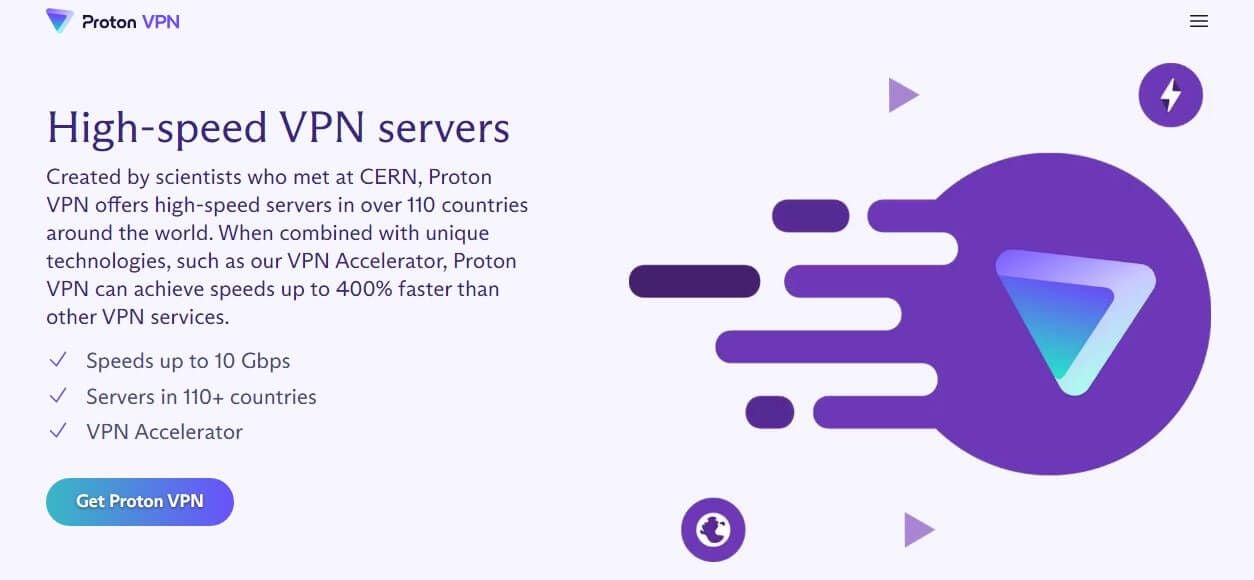
Lastly, let’s talk about Proton VPN. This provider is among the VPNs with the best speed thanks to its high-quality, sizeable server network. Proton VPN has 8,200+ servers in more than 110 countries, but the good news is that servers are never under extreme load as it’s not as popular as other providers.
Furthermore, Proton VPN uses WireGuard and supports a feature called VPN Accelerator (a set of technologies that can increase your VPN speeds by over 400% in the provider’s own words). This Swiss provider sports P2P and streaming servers, where the latter are efficient at unblocking Netflix, BBC iPlayer, and Hulu.
The main focus of Proton VPN is security and privacy and in this case, it excels. With the no-logs policy and the strongest encryption, this is the provider to choose if anonymity is your main issue. But what about its performance? Let’s see…
Speed Test Results
Let’s now check the speed test results of Proton VPN in the same locations to see if it performs as well as it should be:
UK:
- Ping: 56 ms
- Download: 88.63 Mbps
- Upload: 12.01 Mbps
US:
- Ping: 164 ms
- Download: 69.93 Mbps
- Upload: 11.55 Mbps
Japan:
- Ping: 300 ms
- Download: 59.87 Mbps
- Upload: 8.51 Mbps
Australia:
- Ping: 367 ms
- Download: 53.61 Mbps
- Upload: 6.23 Mbps
Proton VPN performs well and is very similar to Surfshark in terms of overall performance and speed. However, Surfshark is a tiny bit faster than Proton VPN, which can be noticeable in practice when using very distant servers in Australia and Japan (relative to my location).
Still, I would say that Proton VPN is a very good VPN and its performance is more than enough for quality time on Netflix or torrent sites. Although a bit more expensive, I recommend its cheapest 2-year plan with a 30-day money-back guarantee with no conditions.
Are There Fast Free VPNs?
Unfortunately, I’ve yet to see a fast free VPN for Windows, as all of them are pretty poor performance-wise. Free providers have slow speeds due to outdated protocols, smaller server infrastructure, and sometimes – intentionally.
Proton VPN offers a free plan as well and it has 5 server locations and significantly slower speeds. Simply put, the company “forces” you to buy a premium plan to get better speeds by intentionally slowing them down in the free plan.
Some free providers simply can’t achieve the speeds you want no matter what and that is for the other reasons I mentioned. Hola VPN, Betternet VPN, TurboVPN, and other low-quality free providers are known for poor performance that can even tamper with simple web browsing.
If we factor in a couple of servers they offer and the thousands of users they’re serving, it’s easy to conclude that these servers are overloaded, and as such, can’t maintain stability and performance. It’s not strange for a free VPN to randomly disconnect from a server and expose your IP either.
I would really like to recommend a fast and free provider but as of now, I can’t do that because I would lie to you. A better solution, if you want to go this route, is to use the premium providers I talked about for free for 30 or 45 days with their money-back guarantees – and get a refund afterward.
You can do that with all 5 of them, which will result in up to 165 days of FREE use, which isn’t that bad.
Why Do You Need the Fastest VPN
Having a fast VPN by your side means not having to compromise on the quality of your internet experience. While general web browsing can be done with “slower” providers, it’s pretty rare for people to just browse the web and do nothing else.
Usually, we’re talking about downloading, uploading, and media consumption which isn’t possible without a fast provider. The fastest VPN won’t reduce your speeds much, which will allow you to enjoy streaming on Netflix or HBO Max in 4K quality with no buffering.
In addition, if you’re a content creator, a fast provider will let you upload videos, songs, or images quickly and safely due to the level of security that the VPN offers. This will ensure that you don’t sacrifice security over performance which is often the case with low-quality providers.
Another reason why you need a fast provider lies in downloading and P2P activities. Slow providers will make the download process much more tedious, while the faster ones will reduce download or torrent performance very slightly.
However, you once again get security, which doesn’t come at the expense of performance. Finally, I should mention another aspect – online gaming. Here, you want the provider with the best possible performance, both in terms of speed and stability.
Such a provider will ensure low pings, thus, preventing unwanted lag that can cripple your gameplay experience. With everything said, it’s pretty obvious that having a fast provider is essential for day-to-day activities, especially those that require a lot of bandwidth.
Summary
Finding the fastest VPN in 2025 can be a very difficult task if you don’t know where to look. There are tons of providers on the market, and to be honest, most of them aren’t what I’d call impressive in terms of performance. Even paid providers fail to deliver the level of performance we admire.
However, if you want the provider with the fastest speeds, I would wholeheartedly recommend NordVPN and the NordLynx protocol which makes it the best-performing provider. ExpressVPN and CyberGhost are slower but they’re pretty close.
The last two providers – Surfshark and Proton VPN – aren’t on the level of the first three VPNs. However, they are solid performers that will outperform similarly-priced providers. At the end of the day, it’s up to you to make a choice depending on your needs and finances.
I advise choosing NordVPN but if you plan on spending a bit more money, ExpressVPN is great. CyberGhost, Surfshark, and Proton VPN should satisfy your needs if you’re on a tighter budget too but don’t expect them to be on NordVPN’s or ExpressVPN’s level.
FAQ
Let’s now address a few more questions we haven’t answered in this review.
Can a VPN increase my internet speed?
The answer to this question is, in most cases, no. VPNs tend to reduce your internet speed because of factors like encryption and your physical distance to the server you’re using. However, in some instances, a VPN can indeed increase your speed.
And that is if we’re talking about ISP throttling, also known as bandwidth throttling.
This is when your Internet Provider intentionally slows down your speeds during bandwidth-hungry activities such as gaming, streaming, or torrenting. In this case, you’ll experience stuttering, high latency, or simply endless buffering, which proves that something’s going on.
Using a VPN will eliminate ISP throttling by hiding your IP and encrypting your traffic. This way, your ISP won’t be able to control what you do online, and by definition, it won’t be able to impact your speeds and performance.
If you’re using a fast VPN like NordVPN here, you can expect your speeds to be faster than the throttled speeds you previously had.
What is the best VPN for gaming at low ping?
The fastest possible VPN! As you see from the speed test results above, that is NordVPN, closely followed by ExpressVPN and CyberGhost. However, to ensure you’re really getting blazing-fast performance, we recommend sticking to NordVPN and its 10+ Gbps speeds.
Is Tor Browser faster than a VPN?
No, Tor is actually much, much slower. Our Tor vs VPN comparison showed the differences between these two solutions where we concluded that the latter is infinitely better in terms of performance. Tor Browser is really slow because your traffic travels through multiple nodes in the Tor network.
A VPN will slow down your speed but not by much if you’re using NordVPN. While a VPN’s speed reduction can be 10-20% (NordVPN), Tor can make this go much higher and a 50-70% speed reduction is typical, as the browser shows much longer page-loading times and latency.
If you want to browse the web smoothly and ensure your privacy, Tor isn’t the best. It’s great for anonymity, whereas, a VPN like NordVPN is great for privacy and speed.